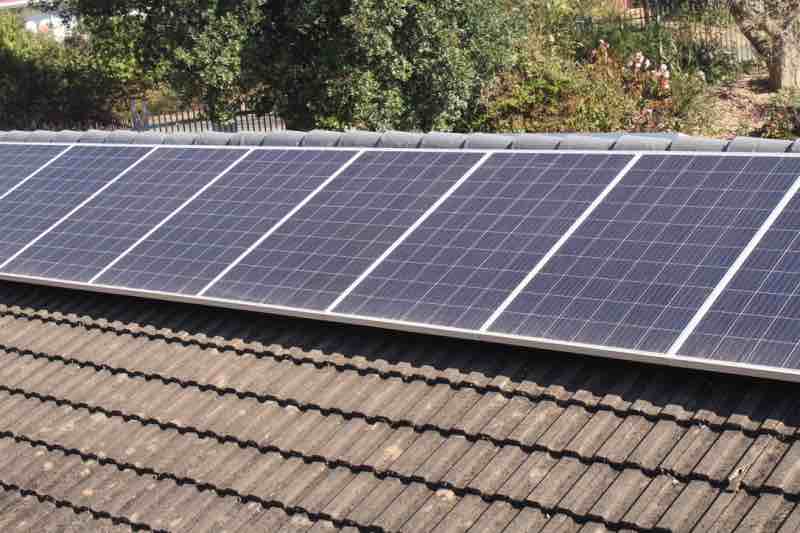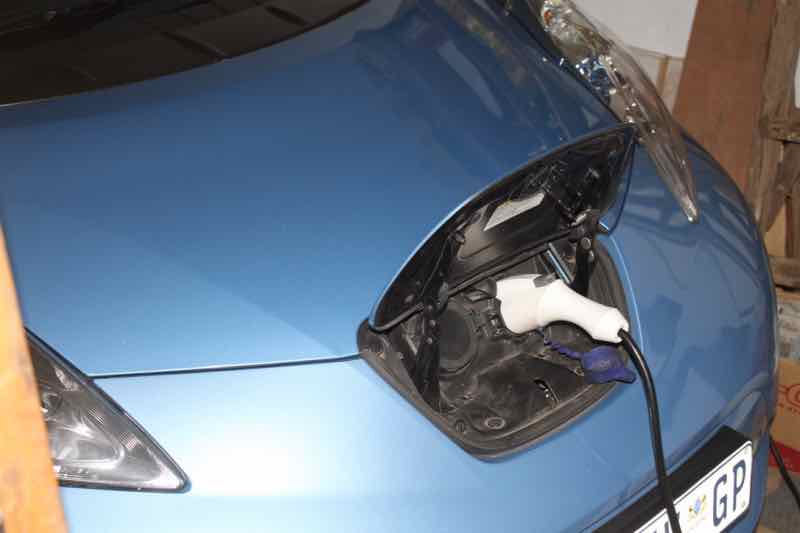- Homepage
- Our green solar power
- Going Off the Grid
Going off the grid
Going off the grid is a big decision that must first be carefully weighed. Are there other options? Our choice finally was to go with prepaid electricity, but remaining connected with no monthly line or MCB-charges.
Big decisions are not made in a hurry, nor should they be but finally we have reached the opinion that going off the grid seems the less sensible thing to do.
In the past I have been adamantly against the notion unless you have a huge Eskom line charge, or a lot of money for battery storage. Both reasons still apply, though the price of lithium-ion is coming down and the efficiency improving.
Quick guide
More detail

"Nersa has granted Eskom an increase of 18.65% for the 2023/2024 financial year."
This page was last updated on 13th January, 2025.
The reliability and quality of the power fed to us by the municipality is dropping, in part due to factors beyond their control. Stormy-weather, complete lack of monitoring of scrap yards that encourages thieves to steal copper wire and the shenanigans at Eskom should not be laid at their door.
Likewise if dead trees leaning over the power-lines from private gardens crash down and damage municipal property, that is our fault; and frankly we should be charged for the repairs.
Plus the cost of this inconsistent and poor quality power is rising rapidly. Nersa has just approved a hike of 18.65%, considerably up on the 13.8pc last year; to which the municipality will add a cut. The price to the public is almost certainly going to increase by over 20 percent in July, 2023.
Due to a huge miscalculation by Nersa the big hits in electricity-prices have continued since 2020.
Eskom has applied for increases over the next three years, starting with 20.5%. If allowed the standard tariff will soon rise to R2.65 per kWh in July, 2023 according to Energize.
Latest figures show that Eskom applied for a 31% increase in 2023; they didn't get it but 18.65pc is way above inflation.
Going off the grid
Year
2019
2020
2021
2022
2023
Projected price
R1500
R1800
R2160
R2592
R3396
R30,000 per annum is a lot to
pay for power that is not reliable; and sends you spikes that damage the
wiring in your home and your electronic goods. The payback-time for
going solar is dropping every year when you include these miscellaneous costs.
On the other side of the equation going off the grid means cold showers
when the Hilton mists sweep in for three or more days as happens
several times a year; that possibly suggests installing a gas-geyser though we have decided against it. Not showering on perhaps half a dozen miserable evenings per annum is acceptable to us.
But clearly the days of high-quality, cheap electricity are gone for ever.
“Strange times are these in which we live when old and young are taught in falsehood’s school and the one man who dares to tell the truth is called at once a lunatic and fool.”
- Plato
The other political factor, for which the municipality really should
not be blamed, is that it is clearly Cosatu’s policy to go on regular
prolonged strikes demanding what employers consider unreasonable wage-increases. As I write the evening headlines scream that the automotive sector can afford the call for a 20% salary hike.
The net result is that Municipalities across the country have retrenched a large part of their workforce, both the good and the bad, in favour of outsourcing the jobs to local contractors; many of them were presumably previously employed by the local authority.
What swung matters in favour of going off the grid was the decision by our municipality to appoint an incompetent contractor to install a new transformer in Hilton. Lacking the basic knowledge of how the neutrals should be wired, they turned on the power and went home when the job was complete, unaware that the whole street was being fed a catastrophic 431V. The damage was colossal, and insurance-companies refused to pay for the destruction caused by the surge from the utility.
They also blew out the municipal street lights which are yet to be repaired nearly three-years later.
Pascal's wager
Pascal's wager
has been vindicated; ten years ago it made more sense to start going
off the grid. The large gains from our investment have far outweighed
the possible losses we contemplated back then.
Two nights ago when the power went off numerous times, a friend measured
that he was receiving only 110V. A "brown-out" like that severely
stresses motors as in fridges. Slowly all the factors are swinging in
favour of going off the grid except for short periods of need.
One
of those factors is that the old lead-batteries should not be drained
below 70% of their capacity; but the new lithiums are both cheaper and
can be used, some say down to a third or less of their total storage.
They will also accept a full boost charge at lower light intensity when the voltage from the panels reaches 13.4V instead of the 14.8 required for lead-cell batteries.
No longer does one need a huge bank of batteries; and one can simply add more capacity in the years ahead, which you cannot do with lead. Plus the charge parameters of lithium-cells are far better.
Blaise Pascal was an incredibly intelligent man living some four centuries ago. A deep thinker, a mathematician and a physicist he was way ahead of his time. He is generally known as the Father of Probability Theory. What I love about his "wager" is that he forces us to take a position on any number of subjects, including whether there is a Creator God or not; fence-sitting is not allowed.
For example you can apply his wager to whether going off the grid makes sense or not; or we should not drink alcohol and in fact any topic that is puzzling you.
Cost of air pollution
"Air pollution and greenhouse gas emissions from fossil fuels cost the South African economy as much as R550 billion each year."
- Institute of Sustainable Development
Air pollution has a huge impact on our well-being; there is massive research confirming the cost of many diseases and our mortality[3]. It is no coincidence that C19, predominantly a lung condition, flourished first and foremost in highly industrialised societies with excessive rates of smog.
Add to that the ravages of climate-change, seen all around us, and we can grasp the imperative of going off the grid for those who can afford it. This is the time to consider saving for a solar farm.
So it will be a step at a time process; first the installation of more panels and a new lithium battery. Then there will be trials to see how well we manage without the grid, and then finally perhaps a gas-geyser.
Going solar to date has not been a huge saving, but we have had clean electricity when everyone else has been grumbling. We anticipate much the same in the future; but a lot less stress when there is load-shedding. And none of the power surges that cause such massive damage to our appliances.
A huge turn was the purchase of an inexpensive old E-car[1]; that is charged by solar power in the middle of the day when we have surplus power.
Going off the grid

Our latest thinking is to stay on the grid but go over to a prepaid electricity meter, and turn off the mains switch for protection from surges except during inclement weather; more about that in the future. Solar systems tend to evolve over time; I have found it essential to keeping thinking and reading, and talking to others.
It is also important to be flexible and ready to change an opinion and try something different. For example, it has been for several years our plan to put in a gas geyser for hot water during inclement weather; now I have realised it is much simpler to go on to a prepaid meter, with no fixed monthly charges, and happily pay the higher-rate for the odd wet days.
Here is another excellent viewpoint about going off the grid.
When browsing use right click and "Open Link in New Tab" or you may get a bad gateway signal.
The material expressed on this page is gleaned from the nutritional and environmental literature; it is clearly referenced. A plain distinction is made between the author's opinion and that which is scientifically proven. When in doubt consult your health professional.
To suggest a correction or clarification, write to Dr Bernard Preston here. Contact.
Newsletter
Our newsletter is entitled "create a cyan zone" at your home, preserving both yourself and Mother Earth for future generations; and the family too, of course. We promise not to spam you with daily emails promoting various products. You may get an occasional nudge to buy one of my books.
Here are the back issues.
- Lifestyle and ideal body weight
- What are ultra-processed foods?
- Investing in long-term health
- Diseases from plastic exposure
- Intensive lifestyle management for obesity has limited value
- A world largely devoid of Parkinson's Disease
- The impact of friendly bacteria in the tum on the prevention of cancer
- There's a hole in the bucket
- Everyone is talking about weight loss drugs
- Pull the sweet tooth
- If you suffer from heartburn plant a susu
- Refined maize meal and stunting
- Should agriculture and industry get priority for water and electricity?
- Nature is calling
- Mill your own flour
- Bake your own sourdough bread
- Microplastics from our water
- Alternative types of water storage
- Wear your clothes out
- Comfort foods
- Create a bee-friendly environment
- Go to bed slightly hungry
- Keep bees
- Blue zone folk are religious
- Reduce plastic waste
- Family is important
- What can go in compost?
- Grow broad beans for longevity
- Harvest and store sunshine
- Blue zone exercise
- Harvest and store your rainwater
- Create a cyan zone at your home
Did you find this page interesting? How about forwarding it to a friendly book or food junkie? Better still, a social media tick would help.
- Homepage
- Our green solar power
- Going Off the Grid
Address:
56 Groenekloof Rd,
Hilton, KZN
South Africa
Website:
https://www.bernard-preston.com